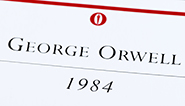6.3 Post-truth
In many ways Nineteen Eighty-Four anticipated the current phenomenon of post-truth. Post-truth may be defined as:
The circumstances in which objective facts are less influential in shaping public opinion than appeals to emotion and personal belief.
… a phenomenon… where emotional response and emotional resonance matter more than facts and evidence in decision making and in political discourse.
In the following interview, Matthew D’Ancona, a Guardian columnist, sets out what he means by the term and the impact he thinks it will have on the future of politics.
Transcript: Audio 2
Post-truth can be compared to the concept of doublethink, a term Orwell introduced in Chapter III of Nineteen Eighty-Four:
To know and not to know, to be conscious of complete truthfulness while telling carefully constructed lies, to hold simultaneously two opinions which cancelled out, knowing them both to be contradictory and believing in both of them; to repudiate morality while laying claim to it
Doublethink, then, forces people to ignore an objective reality and accept an alternative ‘truth’. The concept of doublespeak also allows you to reflect on the ways in which conspiracy theories and the spread of ‘fake news’ are a characteristic of a post-truth society. Once again, it can be argued that this is enabled by social media – which often serves as an echo chamber and enables lies to spread quickly. One recent example is the ways in which the anti-vaccine lobby was able to perpetrate false claims and stories about the provenance and safety of the various COVID-19 vaccines. Twitter, Facebook and so on now use software to catch automated accounts (known as bots) but many more ‘sophisticated’ bots escape attention. Therefore, another serious concern is the apparent ease by which it is still possible to create ‘fake’ social media accounts (often from so-called troll farms), which can fabricate posts and amplify deliberate lies and other forms of ‘disinformation’ so that they are seen, believed, and passed on by more ‘real people’.

Authoritarian states such as Russia and China appear to routinely manipulate social media platforms to neutralise domestic dissent. However, in recent years there have been credible claims that Russia has used Western social media platforms to attempt to destabilise Western democratic institutions or influence the outcome of certain elections. For example, there were accusations of Russian involvement in the US presidential election of 2016 and the UK pro-Brexit campaign. However, the manipulation of social media is not confined to authoritarian states. Social media is a low-cost method of campaigning. Some would claim that this is a democratising development because it allows more direct forms of democracy. However, critics would also point out that by enabling politicians to bypass the traditional media (the press, radio, and television), it also allows them to bypass its editorial controls as well. The one-time Trump aide, Steve Bannon once claimed that the mainstream media was the ‘real opposition’ to Donald Trump (Gambino, 2017).
Orwell set great store by the ‘truth’. Of course, many politicians have always relied on lying as a strategy to get themselves out of difficult situations. However, what Orwell termed ‘organised lying’ (Orwell, 1946, 1947, p. 383) is not the same as spur of the moment expediency. It is, as Orwell pointed out, systematic and integral to totalitarianism. Totalitarian regimes create their own history by ‘rewriting the past’ because it is necessary for the past to be re-shaped to suit the needs of the regime. It was in Spain that Orwell first realised how deliberate, systematic lies may be used as political weapons and how readily those lies will be accepted. In a totalitarian society, only one version of the ‘truth’ is allowed at any given moment. In ‘post-truth’ society there are many versions of the ‘truth’ circulating at any one time. However, if there is less regard for ‘objective facts’ in a post-truth society, does that make it easier for authoritarianism (which may lead to totalitarianism) to gain a foothold?
What is also new about the new era of post-truth is the extent to which it demonstrates how standards in public life have changed. Where it was once obligatory for a politician caught out by a major lie or cover up to resign from office or suffer the consequences, it no longer seems to be an automatic disqualification. Tony Blair’s political career never recovered from the fall-out from the 2003 invasion of Iraq because the so-called ‘dodgy dossier’ still mattered to the electorate. Nick Clegg’s reputation among younger voters was irrevocably tainted by his failure to keep a promise on tuition fees made in the 2010 Liberal Democrat election manifesto. However, the Boris Johnson premiership from 2019 encompassed several scandals without leading to resignations.
